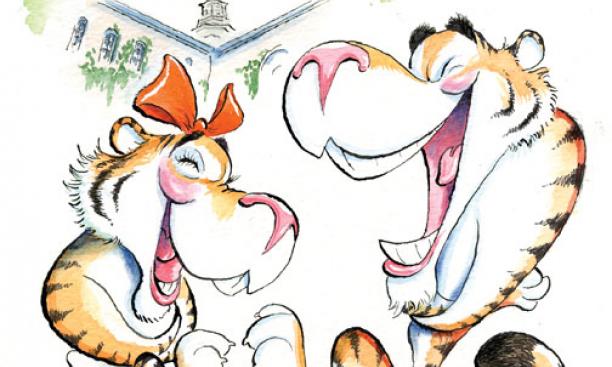

“We’re crazy tonight!” exclaimed senior Willie Myers at the start of a late-November rehearsal for the Quipfire! comedy team.
But there’s a method to the madness. Visits with several Princeton comedy groups suggested that there’s no such thing as an easy laugh. Consistently good humor demands consistent, concerted effort.
Quipfire!, one of Princeton’s two improvisational humor troupes (the other is Fuzzy Dice), performs throughout the year. The “crazy” November rehearsal the group held in a Jones Hall seminar room was one of many in advance of the group’s December shows.
Instead of working from scripts, Quipfire! performers create sketches on the fly using short audience prompts. Improv practice helps the group’s nine members sharpen their scene-building skills and comedic timing.
In sets of three and four, the rehearsing performers took turns acting out practice prompts. “Bottleneck” set the stage for a shootout in a ChapStick factory; “Crouching” concerned a family’s tumultuous visit from Aztec god Quetzalcoatl.
But calamitous incident alone does not a successful scene make. The best skits, members say, grow out of recognizable relationships, some core relatable truth.
Another comedy group, Princeton South Asian Theatrics (PSAT), writes and performs two full-length plays a year (again: effort!). Its latest debuted the weekend of Dec. 3, a crime caper called Dial M For Marriage Murder.
PSAT, which bills itself as “the nation’s first South Asian theater group,” was founded in 1998 as a more drama-minded organization, said junior Myra Gupta, PSAT’s co-president.
“Over the years, we realized that Indian accents are maybe the funniest things in the entire world, so we decided to make our plays exclusively comedies,” Gupta said.
At a November run-through of Dial M, a full complement of Indian accents was on display, ranging from Telugu in the east to Gujarati in the west.
Most performers just imitate their parents, Gupta said.
With a 26-actor cast, rehearsals were a complex undertaking. The play’s setting, an Indian wedding, calls for many large, tumultous crowd scenes, some of which feature a cow. “Of course there’s a cow,” Gupta said. “It’s Indian.”
In addition to leading PSAT, Gupta also serves as the editor-in-chief of The Princeton Tiger, which stands apart from other Princeton humor groups for its focus on the printed word.
Weekly meetings at 48 University Place are one venue for Tiger staff members to pitch possible article ideas.
“An amazing new superhero comic: The Five-O’Clock Shadow.”
“Time magazine’s 100 least-influential people.”
“Feminist Spanish teacher refuses to do masculine words.”
But times are changing.
Financial constraints have led the magazine, first published in 1882, to cut back its print run from six to two issues a year. Most articles now find an exclusive home on Tiger’s revamped website (www.tigermag.com).
The switch to Web publishing has also spurred Tiger’s expansion into a newer medium: the YouTube video.
Last spring, Tiger debuted “Discussions in Contemporary Poetry with Paul Muldoon,” in which Tiger president Jim Valcourt ’12 leads the Pulitzer-winning poet in a deconstruction of “Tik-Tok,” a song by dance-pop singer Ke$ha (Muldoon: “Tik-Tok ... I mean that’s time, you know what I’m saying?”). The video was picked up by a number of media outlets.
Fall brought “Welcome To Princeton,” a collaboration with the Undergraduate Student Government in which the ghost of Woodrow Wilson 1879 shows a new student that “there’s a lot more to Princeton than using grade deflation as a scapegoat.” The video features a senior member of the University administration in a last-minute cameo.
The group is hard at work filming new mini-movies, and Valcourt sees a strong digital future for his storied publication.
“There will never be a shortage of things to ridicule,” he said.
By Carolyn Edelstein ’10 GS
Members of Terrace Club voted Dec. 7 to broaden its membership, opening its doors to as many as 10 graduate students this spring.
During a debate over pitchers of homemade spiked cider, some members of the eating club voiced concerns that grad students would usurp undergraduate spots (they will not, promised Ricardo Lopez ’12, the club’s president-elect). Another said that the presence of grad students might deter sophomores from joining Terrace. To vociferous support, Rachel Jackson ’11 countered that the Terrace community is famed for its inclusiveness and embrace of the eclectic values that appeal to individuals from both student populations.
Still, Terrace members said that graduate students who join the club likely would be a narrow, self-selecting group.
The club’s graduate board voted in favor of admitting a small number of graduate students a few years ago, but the experiment was short-lived, said Harold Helms ’56, who chairs the board.
Grad students struggled to pay the full club fee, which covers all meals and social events. The fee is now $7,200 per year, and Lopez hopes to negotiate a shared-meal plan option with the University to subsidize the membership cost and allow grad students to take meals at Terrace and other locations.
Jason Wexler GS, who frequents the club’s live concerts, said that though he would not want to give up the graduate-student environment of Procter Hall, a split-meal plan with Terrace “would offer a nice change from the dining hall setting.”
President Tilghman voiced support for Terrace’s plans as a move to help bridge the divide between undergraduate and grad students “in line with measures the University has taken, including the creation of Campus Club and the introduction of resident graduate students at the residential colleges.”
Likewise, Khee-Gan Lee GS, communications director for the Graduate Student Government, wrote in a letter to The Daily Princetonian that Terrace’s move “would be a step forward in the integration and acceptance of graduate students in the University.”
But Alan Futran and Stephanie Amato, first-year chemical engineering students, said they are not inclined to join an undergraduate club. “I think we grad students feel like we have been there, done that,” Amato laughed.
